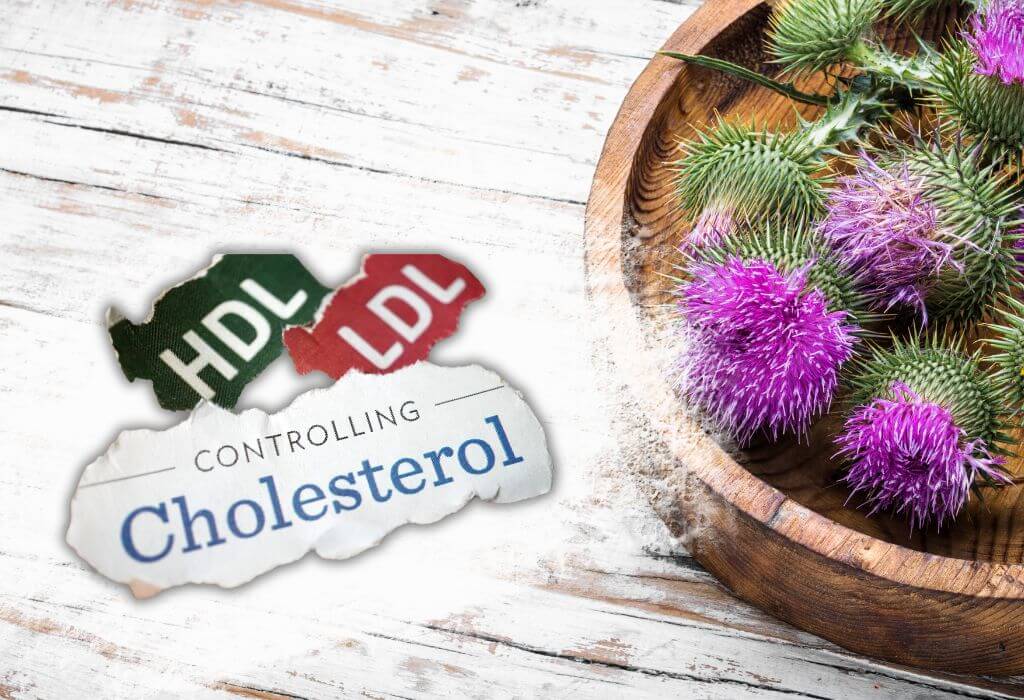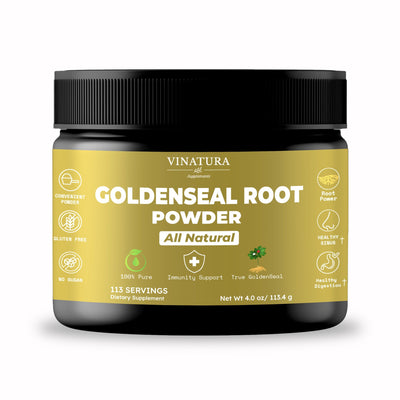
Does Milk Thistle Lower Cholesterol?
Cholesterol is essential for health, but high levels can cause serious problems like artery plaque buildup, heart disease, diabetes, and stroke.
Milk thistle can effectively do so if you're seeking natural remedies to lower cholesterol levels.
This article explains how milk thistle affects cholesterol levels and mentions other herbs that can help.
Before exploring further, please read the disclaimer located at the end of this webpage.
Key Takeaways
- Milk thistle can help reduce LDL-C cholesterol and neutral fats while increasing good HDL cholesterol.
- Milk thistle benefits diabetes patients through its anti-inflammatory effects, oxidative stress reduction, protection of pancreatic Beta cells, and improvement of insulin sensitivity.
- Many studies and real-life cases show that milk thistle can improve cholesterol levels, especially for diabetic patients.
Does Milk Thistle Lower Cholesterol?
Yes, milk thistle is a natural herb that can lower blood cholesterol levels.
Milk thistle has an active compound called silymarin, which can lower cholesterol, LDL-C, and neutral fats while increasing good HDL cholesterol [1].
A study conducted on 40 patients with type 2 diabetes (T2DM), using a dosage of 140 mg of silymarin divided into 3 doses per day, showed significant reductions in fasting blood sugar levels, serum insulin levels, neutral fats, and lipoprotein cholesterol concentrations compared to the untreated group.
It can be concluded that milk thistle reduces cholesterol levels and improves blood sugar indices in type 2 diabetes patients [2].
Read more: Does Milk Thistle Lower Blood Pressure?
What are the Benefits of Milk Thistle for Diabetes?
Anti-inflammatory Effects

Milk thistle has strong anti-inflammatory and antioxidant effects [4]. Inflammation is a common factor contributing to chronic conditions, including diabetes.
The anti-inflammatory properties of silymarin create an environment with less inflammation, limiting the disease-causing potential of harmful cells and benefiting those managing diabetes.
Oxidative Stress Reduction
Oxidative stress can weaken the body's defense against free radicals. Many studies show a close link between high blood sugar, oxidative stress, and diabetes complications due to the body's overproduction of reactive oxygen species (ROS) [5].
Additionally, silymarin in milk thistle can reduce oxidative stress by lowering levels of malondialdehyde (MDA) and increasing levels of reduced glutathione (GSH) compared to the untreated nonalcoholic steatohepatitis (NASH) patient group [6].
By exerting antioxidant effects on liver cells, milk thistle demonstrates its superior potential in combating oxidative stress, reducing the risk of cell damage, particularly in pancreatic cells related to insulin production.
Protection of Pancreatic Beta Cells
Pancreatic beta cells play a crucial role in maintaining the balance of glucose homeostasis by acting as the primary source of insulin.
These cells are responsible for synthesizing, storing, and releasing insulin, playing a central role in managing diabetes [7].
A study evaluating the effects of silymarin on pancreatic beta cells through the pathway of β-cell damage caused by IL-1β and/or interferon (IFN) has yielded positive results, demonstrating the direct protective effects of silymarin on pancreatic β cells and the significant potential of milk thistle for diabetes treatment [8].
Learn more: Does Milk Thistle Lower Iron Levels?
Improving Insulin Sensitivity

Insulin sensitivity is very important for managing diabetes. Insulin helps move glucose from the blood into cells for energy.
When insulin sensitivity is low, the body needs more insulin to move the same amount of glucose into cells. This can lead to increased blood glucose levels, a major factor in diabetes.
Research suggests that silymarin, the primary component of milk thistle, may reduce insulin resistance (IR) and increase insulin sensitivity through comparison and control between a group of 60 diabetic patients with liver fibrosis treated with 600 mg of silymarin per day for 6 months versus a non-user group [9].
By increasing insulin sensitivity, milk thistle helps the body better control blood glucose levels.
What Science Says About Milk Thistle and Cholesterol?
Milk thistle effectively improves cholesterol levels, particularly in patients with diabetes. This has been addressed in numerous studies and shared by many experts, specifically:
Another study conducted in 2006 assessed the effects of the herbal medicine extracted from Silybum marianum seeds on antioxidant activity and reducing cholesterol levels in diabetic patients.
The study concluded with promising results and improvements in blood sugar levels in these patients [3].
Another study evaluated the safety and efficacy of a fixed combination of Berberis aristata and Silybum marianum for dyslipidemia.
Four randomized trials on 491 patients showed the following composite results: Silybum marianum significantly reduced low-density lipoprotein levels, total cholesterol, and fasting blood glucose levels [10].
Additionally, insights from Dr. Keith Roach may provide further answers regarding the effect of milk thistle on cholesterol levels.
He states: Milk thistle may reduce LDL cholesterol, best demonstrated in patients with diabetes. However, the ability to reduce cholesterol with this herbal remedy has not been confirmed for heart disease risk or cardiac conditions.
The last study in this article aims to provide you with is an experiment conducted in 2016, evaluating the effects of Silybin on lipid characteristics in mice with elevated blood cholesterol.
The results showed a significant increase in total cholesterol levels in mice fed a high-cholesterol diet, and treatment with Silybin significantly reduced total cholesterol in serum, triglycerides, LDL-C, and significantly increased HDL-C in the liver and reduced other lipid components [11].
Success Stories and Anecdotal Evidence about Milk Thistle and Cholesterol

Not only validated through research studies, the natural effects of milk thistle in reducing cholesterol levels also bring promising results in real-life scenarios.
One user shared that both her husband and she had a family history of high cholesterol, and using statins caused severe muscle cramps.
When she tried the effects of milk thistle, she was amazed at its benefits. She shared that cholesterol levels seemed to be under control, and muscle cramps disappeared.
Another testimonial from users Joe Graedon and Teresa Graedon stated that initially, they were quite apprehensive about the cholesterol-lowering effects of combining statins with milk thistle.
However, after consuming this combination for 3 months as prescribed by their doctor, along with a diet regimen, it normalized their cholesterol levels without encountering any difficulties or side effects.
How Well Does Milk Thistle Lower Cholesterol?
As mentioned above, milk thistle can reduce cholesterol levels while increasing the amount of beneficial HDL cholesterol, which is beneficial for patients with diabetes, type 1 and type 2 diabetes.
This is mentioned in many studies and validated by those who have used it.
Milk thistle works well in reducing cholesterol levels and is effective for diabetic patients due to its anti-inflammatory antioxidant effects, improving insulin sensitivity, and protecting pancreatic beta cells.
It's important to note that while milk thistle can help reduce cholesterol, it may not work for everyone. Talk to a doctor or nutrition expert to see if milk thistle is right for you.
Other Herbs May Lower Your High Cholesterol
Besides milk thistle, many other herbs can help lower cholesterol and improve your health, such as:
- Fenugreek seeds and leaves: Supplementing with fenugreek may help reduce blood cholesterol levels, especially in people with diabetes.
- Artichoke leaf: Artichoke extract is used as part of a dietary regimen to reduce LDL cholesterol and neutral fats. They may lower blood lipids, especially in people with elevated blood lipids.
- Yarrow: Yarrow is a flowering herb used in traditional medicine to reduce cholesterol.
- Holy basil: This is a slightly spicy, bitter herb that can be eaten raw or used as a seasoning in dishes. They reduce total cholesterol and LDL when consumed at least 1 gram (g) per day.
- Ginger: Ginger helps reduce neutral fats and LDL cholesterol when consumed up to 2g per day and can be added to food or used in extracts.
Conclusion
In conclusion, research studies and practical usage indicate that milk thistle may help control and reduce blood cholesterol levels.
The nutrients and bioactive compounds in milk thistle reduce cholesterol absorption, improve insulin sensitivity, and regulate blood lipid levels.
However, using milk thistle to treat high cholesterol should always be done under the supervision and advice of a doctor.
Combining it with a healthy diet and exercise regime is essential for quick results.
References
- [1] Mohammadi, Hamed, et al. “Effects of Silymarin Supplementation on Blood Lipids: A Systematic Review and Meta‐Analysis of Clinical Trials.” Phytotherapy Research, vol. 33, no. 4, 5 Mar. 2019, pp. 871–880, https://doi.org/10.1002/ptr.6287. Accessed 11 July 2022.
- [2] Ebrahimpour-koujan, Soraiya, et al. “Lower Glycemic Indices and Lipid Profile among Type 2 Diabetes Mellitus Patients Who Received Novel Dose of Silybum Marianum (L.) Gaertn. (Silymarin) Extract Supplement: A Triple-Blinded Randomized Controlled Clinical Trial.” Phytomedicine, vol. 44, May 2018, pp. 39–44, https://doi.org/10.1016/j.phymed.2018.03.050.
- [3] Huseini, H. Fallah, et al. “The Efficacy OfSilybum Marianum (L.) Gaertn. (Silymarin) in the Treatment of Type II Diabetes: A Randomized, Double-Blind, Placebo-Controlled, Clinical Trial.” Phytotherapy Research, vol. 20, no. 12, 2006, pp. 1036–1039, https://doi.org/10.1002/ptr.1988.
- [4] “Milk Thistle Information | Mount Sinai - New York.” Mount Sinai Health System, www.mountsinai.org/health-library/herb/milk-thistle#:~:text=It%20reduces%20inflammation%20(which%20is.
- [5] Piconi, Ludovica , and Lisa Quagliaro. “Oxidative Stress in Diabetes.” De Gruyter, De Gruyter, 1 June 2005, www.degruyter.com/document/doi/10.1515/CCLM.2003.177/html. Accessed 12 June 2024.
- [6] Haddad, Yara, et al. “Antioxidant and Hepatoprotective Effects of Silibinin in a Rat Model of Nonalcoholic Steatohepatitis.” Evidence-Based Complementary and Alternative Medicine, vol. 2011, 2011, pp. 1–10, https://doi.org/10.1093/ecam/nep164.
- [7] Bartolomé, Alberto. “The Pancreatic Beta Cell: Editorial.” Biomolecules, vol. 13, no. 3, 8 Mar. 2023, pp. 495–495, www.ncbi.nlm.nih.gov/pmc/articles/PMC10046343/#:~:text=Pancreatic%20beta%20cells%20play%20a, https://doi.org/10.3390/biom13030495.
- [8] Matsuda, Takeru, et al. “Silymarin Protects Pancreatic β-Cells against Cytokine-Mediated Toxicity: Implication of C-Jun NH2-Terminal Kinase and Janus Kinase/Signal Transducer and Activator of Transcription Pathways.” Endocrinology, vol. 146, no. 1, Jan. 2005, pp. 175–185, https://doi.org/10.1210/en.2004-0850. Accessed 18 Oct. 2019.
- [9] MacDonald-Ramos, Karla, et al. Silymarin Is an Ally against Insulin Resistance: A Review. Vol. 23, 1 July 2021, pp. 100255–100255, https://doi.org/10.1016/j.aohep.2020.08.072.
- [10] Tóth, Barbara, et al. “The Effects of a Fixed Combination of Berberis Aristata and Silybum Marianum on Dyslipidaemia – a Meta-Analysis and Systematic Review.” Planta Medica, vol. 86, no. 02, 29 Nov. 2019, pp. 132–143, https://doi.org/10.1055/a-1063-1649. Accessed 11 Apr. 2023.
- [11] Gobalakrishnan, Senthil. “Effect of Silybin on Lipid Profile in Hypercholesterolaemic Rats.” JOURNAL of CLINICAL and DIAGNOSTIC RESEARCH, 2016, https://doi.org/10.7860/jcdr/2016/16393.7566. Accessed 16 Oct. 2021.
Author

Product Disclaimer
Including an ingredient or study does not evaluate, endorse, or recommend any Vinatura product or any third-party product. Some ingredients discussed may not be used in any Vinatura product.
The content of the articles has not been evaluated by the Food and Drug Administration (FDA) and is not intended to promote or endorse any specific product. Any products sold on this website are not intended to diagnose, treat, cure, or prevent any disease.
Opinions and Endorsements
Any claims, statements, or opinions expressed in the articles are those of the author(s) and do not necessarily reflect the views or opinions of the manufacturers of the dietary supplement products. The products sold on this website are separate from the content of the articles and are not directly endorsed or associated with the information presented here.
Liability Disclaimer
The author(s) of the articles, website, and manufacturers of the dietary supplement products do not assume any liability for any potential consequences arising from the use of the information provided in the articles. Ingredient effects, dosages, and safety vary by individual, formulation, and context; some ingredients interact with medications or may be unsuitable during pregnancy or lactation. It is recommended that individuals consult with a qualified healthcare professional before making any dietary or lifestyle changes, including the use of dietary supplements.
Product Usage
Please refer to the product labels and packaging for specific usage instructions and guidelines for the dietary supplement products sold on this website.
Customer Support
For any concerns or questions regarding the dietary supplement products, please contact our customer support team, who will be more than happy to assist you.





Leave a Comment
Be the first to comment.
What do you think?